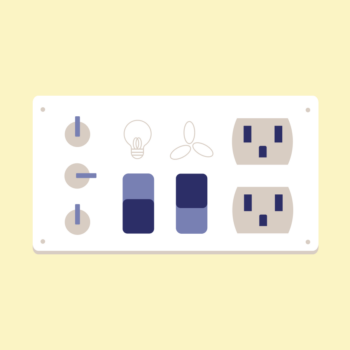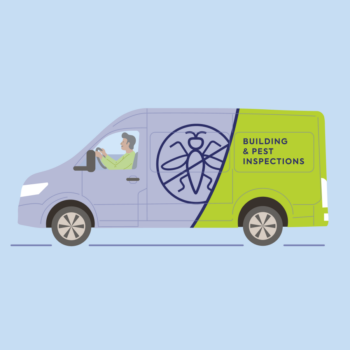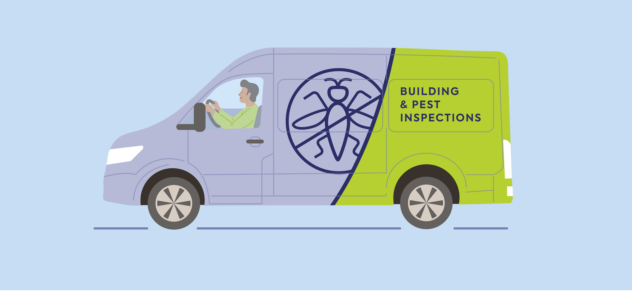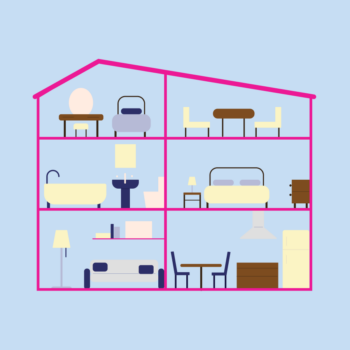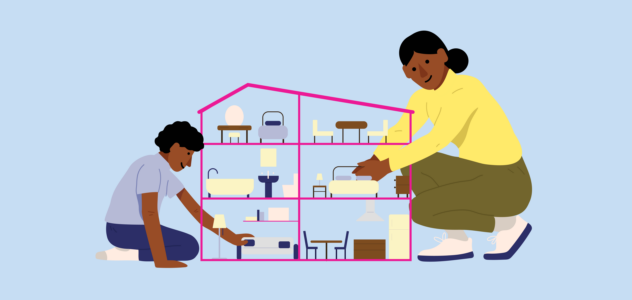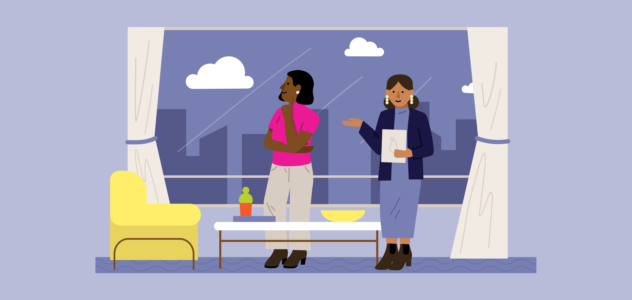There’s a lot to love about apartment living.
Desirable locations, less maintenance, access to amenities, security, affordability – the list goes on.
So it’s easy to see why buying an apartment is a popular option for so many Australians, particularly those entering the property market.
But like anything in the property world, it also comes with some risks, downsides and things to consider.
This article will explore the pros and cons, what to consider, and how buying an apartment can differ from buying an entire property.
But first, what do you *actually* own when buying an apartment in Australia?
It’s a good question.
Different from a house or land, when you buy an apartment, you’re buying the inside area plus part ownership of the entire building. Dividing areas (like hallways, stairs, joining walls and gardens) are usually considered ‘common property.’
For this reason, there’s a *smidge* more to consider when buying an apartment. Let’s dive into the pros and cons of buying an apartment…
The advantages of buying an apartment
Low maintenance
Mowing lawns and pruning gardens not your thing? One of the big selling points of an apartment is the low maintenance – no need for backyard work or cleaning the exterior. Apartment maintenance is generally organised by a ‘strata committee’ or ‘owners corporation’ (AKA a group of elected owners in the building).
Often more affordable
It’s a supply and demand thing. There’s been a lot of apartment developments in big cities around Australia, often making them more affordable than owning a home. Plus, the limitations of an apartment generally make them more financially accessible.
Often in desirable locations
Enjoy the hustle and bustle of city living? Perhaps one of the best things about buying an apartment is the location. You can live in a desirable and sought-after spot (often with an affordable price tag). Or rent it out knowing renters are often drawn to desirable locations.
Can provide an extra layer of security
Apartments are generally more secure than houses. For starters, there are more people around to spot anything out of the ordinary, and there are often multiple checkpoints where you need a key or pass to get through.
They often come with amenities
Shared gardens, gyms, pools, storage and parking spaces – these are a few of the amenities that may come with apartment living.
The disadvantages of buying an apartment
May not increase in value as much as a property with land
If you’re looking for an investment that’ll increase in value quickly, an apartment *might not be it*. They generally don’t increase in value as much (in saying that, there are always exceptions to this rule).
Body corporate or strata fees
On top of your mortgage, you’ll often need to pay body corporate or strata fees to cover the cost of maintenance and repairs (more on this below).
Less space and privacy
To state the obvious, an apartment usually has less space and privacy. You’ll be sharing the building with a few others – this could be a pro or con depending on who you get!
Can be considered a more risky investment
When apartment buildings are large, the odds are higher that a similar property to yours might also be available when it comes time to sell – potentially lowering demand, and the price you can get for it.
Don’t have much control over the overall building look and feel
You can furnish the inside of your apartment however you please, buuuut as for the outside? You won’t have a whole lot of control over the vibe.
What to consider before buying an apartment
There are a handful of things to think about when buying an apartment (that you usually don’t need to consider when buying a property). Let’s break it down.
Strata fees
Also known as body corporate fees, this is when all owners in a building are charged annual fees to cover the cost of maintenance and repairs of shared areas. The fees can vary depending on the amenities of the building, so make sure you’re aware of these fees before you make an offer and factor them into your purchase decision.
What’s more, know what the fee structure is and if there are any upcoming expenditures or issues that they’re raising funds for (you can request the ‘owners corporation AGM notes’ to do a little digging into this).
Level of activity from the owner’s corp
Not all owner’s corporations are equal and some will put in more effort than others. Are they proactively keeping the building in good condition? Or reactively patching things up? Assessing this through observation of the building and AGM notes will give you a little insight.
Review the by-laws
By-laws are laws imposed by the building’s body corporate (hint: they’re pretty important as you’re legally obliged to follow them). It’s a good idea to check they align with your goals and lifestyle – they could have rules around pets, smoking and noise. The strata by-laws can usually be viewed by asking the owner’s corporation, strata committee or strata manager. You can also ask the real estate agent who’s selling the apartment.
Renovating can be more difficult
Ask yourself, am I happy with the apartment layout and interior? Because when you live in an apartment, getting approvals to renovate or make changes can be tricky – you’ll often need permission from the owner’s corp depending on what you’re looking to do.
The overall vibe
In a house, you can easily create your own atmosphere. But living in close proximity to your neighbours means you should place more weight on the overall feeling of the building. Can you hear noise? Are there any odours? Is there enough natural light? What’s the airflow like?
Location value
This one’s a biggy – know whether the location you’re interested in is likely to increase in value. This can ultimately impact how much wealth you build from your property investment, as well as a lender’s willingness to give you a loan in the first place.
See, before lenders approve a home loan for an apartment, they look at things like the size of the apartment, postcode, density and what’s surrounding it (is it a street filled with other apartments or surrounded by houses?) It’s a demand and supply thing – lenders generally only take on a certain number of properties or apartments in each building or postcode to manage their risk.
Building density
By nature, apartments are usually considered ‘high-density living.’ But the density can still vary between buildings. So, it’s a good idea to find out how many apartments are in the given area. This is usually measured as a ratio of apartment units per acre of floor area. Ask yourself if this is a density you’ll be comfortable with.
What’s more, a lender will generally consider the building density before approving your loan so they don’t take on too many ‘cookie cutter’ apartments that won’t hold their value.
Apartment size
How big is the apartment? Are you comfortable with that amount of space? Once again, a lender will often consider the apartment size before approving your loan to avoid too many of the same size and density.
Apartment amenities
One of the perks of apartment living is the amenities, so it’s good to check if what’s on offer matches your lifestyle. Drive a car? Make sure there’s decent car parking available. Have lots of stuff? Check out the storage facilities.
Surrounding infrastructure
Living in an apartment doesn’t just mean you’re close to your neighbours – you’re also close to other buildings and infrastructure. Check out what’s around and make sure this aligns with you. Is there a new development across the road that’ll create lots of noise pollution or block your natural light sources? Or on the flip side, do you love that it’s close to trendy cafes and bars?
Build quality
This can be hard to assess by eye if you’re not a builder by trade. But what you can do is look into the developer. Are there articles about them online? What does their website say? Are there testimonials from people who live in their buildings?
It may also pay to get a building and pest inspection done before making an offer, so you’re going in with eyes wide open.
Off the plan vs existing builds
With existing builds, there will be more certainty around your settlement date (AKA when you finally get to decide where the bar cart will go). If you’re purchasing off the plan, settlement dates can often be changed or pushed out. The finished product can also look a little different to the glossy brochures, in some cases. These aren’t necessarily dealbreakers, just make sure you’re prepared for it.
Security
Apartments often come with more safety and security, which is a big selling point for a lot of people.
Rental return
While houses generally increase in value more than an apartment, in many cases, apartments can have higher rental returns. That could be good news for you if you’re looking for an investment with a solid income stream. But as with anything, it depends on the specific apartment and location – check the rental prices for similar apartments in the area.
So, should you buy an apartment?
As always, choosing whether to buy an apartment depends on you and YOUR goals.
There’s a lot to love about it – desirable locations, less maintenance, access to amenities, security, and affordability.
But there are also a few things to consider – strata fees, density, renovations and capital growth.
Whether you’re still weighing up apartment living or you’re ready to put an offer on one that’s caught your eye, a mortgage broker (or home loan expert as we like to call them) can get the ball rolling or help with pre-approval.
We make it a smooth process (and totally non-intimidating).
- Book a chat with a friendly Finspo expert (online, phew!)
- Tell us about yourself and provide any extra info
- We’ll do the heavy lifting and present you with some loan options and a recommendation.









